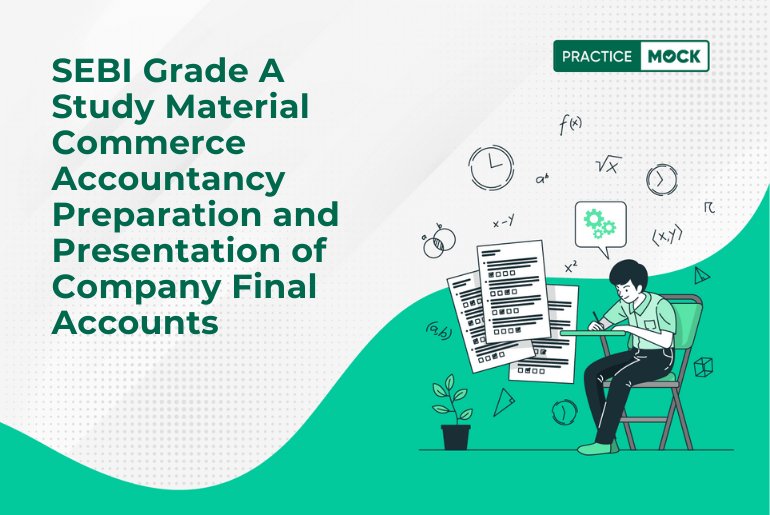The Securities and Exchange Board of India (SEBI) Grade A examination is a highly competitive test for individuals aspiring to join the prestigious regulatory body. For those opting for Commerce and Accountancy as their specialized subject, a comprehensive study plan is crucial. This article delves into the recommended study material and focuses on the nuanced aspects of preparing and presenting Company Final Accounts, a vital topic in the SEBI Grade A syllabus.
SEBI Grade A Commerce and Accountancy Syllabus:
Before diving into the preparation specifics, it’s essential to understand the SEBI Grade A Commerce and Accountancy syllabus. This section covers financial and management accounting, financial markets, financial instruments, and financial management. A comprehensive grasp of these subjects is pivotal for success in the examination.
Recommended Study Material:
To excel in SEBI Grade A Commerce and Accountancy, aspirants must rely on well-curated study material. Some authoritative sources include standard accounting textbooks, journals, and SEBI’s own guidelines and regulations. Additionally, practice papers and mock tests can provide a simulated exam environment, helping candidates fine-tune their preparation.
Understanding the Basics:
The foundation of success in Commerce and Accountancy lies in a strong understanding of the basics. Candidates should revisit fundamental accounting concepts, principles, and conventions. A solid grasp of the accounting cycle, principles of double-entry, and the structure of financial statements is paramount.
Preparation for Presentation of Company Final Accounts:
Company Final Accounts represent a crucial component of the SEBI Grade A Commerce and Accountancy syllabus. Candidates should focus on the preparation and presentation of these accounts, showcasing their ability to interpret and communicate the financial health of a company.
Key Components of Company Final Accounts:
A comprehensive study of Company Final Accounts includes three primary components: the Profit and Loss Account, the Balance Sheet, and the Cash Flow Statement. Aspirants should delve into the intricacies of these statements, understanding how each contributes to the overall financial picture of a company.
Profit and Loss Account:
The Profit and Loss Account, also known as the Income Statement, summarizes a company’s revenues, costs, and expenses over a specific period. Aspirants should focus on classifying various income and expenditure items, understanding their impact on net profit or loss. The ability to interpret and analyze these figures is crucial for SEBI Grade A success.
Balance Sheet:
The Balance Sheet provides a snapshot of a company’s financial position at a specific point in time. Candidates should grasp the classification of assets, liabilities, and equity, ensuring a thorough understanding of the company’s financial structure. An in-depth analysis of the Balance Sheet’s components is vital for answering questions related to financial health and stability.
Cash Flow Statement:
The Cash Flow Statement reflects a company’s cash inflows and outflows during a specific period, categorizing activities into operating, investing, and financing. SEBI Grade A aspirants should understand the importance of cash flow in assessing a company’s liquidity and financial performance.
Interlinking Financial Statements:
A nuanced understanding of how these financial statements interlink is crucial. For instance, the net profit from the Profit and Loss Account impacts the equity section of the Balance Sheet. Aspirants should be adept at tracing the flow of financial information across statements, showcasing their ability to perform comprehensive financial analysis.
SEBI Regulations and Guidelines:
In addition to mastering accounting principles, candidates must familiarize themselves with SEBI regulations and guidelines related to financial reporting. Understanding the regulatory framework is crucial for answering questions related to corporate governance, transparency, and compliance.
Practical Application: Case Studies and Real-world Scenarios:
SEBI Grade A exams often include case studies and real-world scenarios. Aspirants should practice solving case studies related to the preparation and presentation of Company Final Accounts. This practical application enhances problem-solving skills and prepares candidates for the dynamic challenges of the examination.
Mock Tests and Revision:
No preparation is complete without mock tests and revision. Regular practice through PracticeMock mock tests helps candidates manage time effectively during the actual exam. Revision ensures that concepts stay fresh in the mind, solidifying the foundation for accurate and confident answers.
Continuous Learning and Updates:
The financial landscape is dynamic, with accounting standards and regulations subject to change. Aspirants should stay updated on the latest developments in accounting and financial reporting, aligning their knowledge with current industry practices and SEBI guidelines.
Conclusion:
SEBI Grade A Commerce and Accountancy preparation, particularly in the domain of preparing and presenting Company Final Accounts, demands a holistic approach. Aspirants should not only focus on mastering accounting principles but also understand the practical application of these principles in real-world scenarios. Regular practice, simulated exam environments through mock tests, and a commitment to staying updated on regulatory changes will position candidates for success in the SEBI Grade A examination. With meticulous preparation and a comprehensive understanding of the subject matter, aspirants can confidently navigate the complexities of Commerce and Accountancy to ace the SEBI Grade A examination.
- Sign Up on Practicemock for Updated Current Affairs, Free Topic Tests and Free Mini Mocks
- Sign Up Here to Download Free Study Material
Free Mock Tests for the Upcoming Exams
- IBPS PO Free Mock Test 2024
- RBI Grade B Free Mock Test 2024
- IBPS SO Free Mock Test 2024
- NABARD Grade A Free Mock Test 2024
- SSC CGL Free Mock Test 2024
- IBPS Clerk Free Mock Test 2024
- IBPS RRB PO Free Mock Test 2024
- IBPS RRB Clerk Free Mock Test 2024
- RRB NTPC Free Mock Test 2024
- SSC MTS Free Mock Test 2024
- SSC Strenographer Free Mock Test 2024
- GATE Mechanical Free Mock Test 2024
- GATE Civil Free Mock Test 2024
- RRB ALP Free Mock Test 2024
- SSC CPO Free Mock Test 2024
- AFCAT Free Mock Test 2024
- SEBI Grade A Free Mock Test 2024
- IFSCA Grade A Free Mock Test 2024
- RRB JE Free Mock Test 2024
- Free Banking Live Test
- Free SSC Live Test



